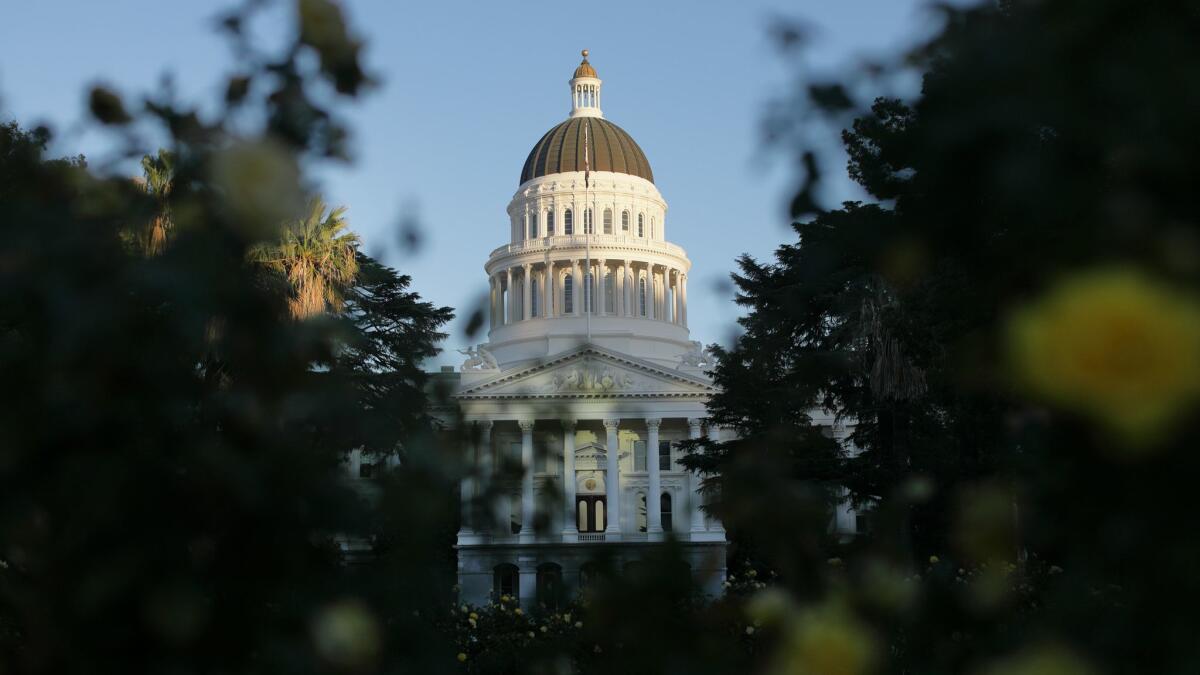California lawmakers reject marijuana banking plan and panic buttons for hotel workers in a frenzy of Sacramento action

- Share via
Reporting from Sacramento — Facing a key deadline for legislation to move forward, California lawmakers on Thursday rejected dozens of bills, including a state-run bank for marijuana growers, government healthcare services for those in the U.S. illegally and hotel panic buttons for cleaning crews who fear sexual assault.
Lawmakers on the appropriations committees in both houses of the California Legislature acted on more than 600 bills, rejecting about 150 of them. The Legislature will adjourn for the year at the end of the month and the bills that moved forward will head to final votes in the Assembly and Senate.
One of the rejected bills, Senate Bill 930, would have allowed the state to license private banks to handle the billions of dollars expected to be generated by California’s legal marijuana industry. Newly licensed pot shops and farms say they can’t put their money in federally chartered banks because cannabis remains illegal under federal law.
Sen. Bob Hertzberg (D-Los Angeles) proposed that the state could license privately financed banks that would issue checks to the businesses to pay rent and state and local taxes and fees. But a legislative analysis said the proposal faced “significant obstacles,” including no protection from federal law enforcement.
“The evolving cannabis industry has sales in the billions, yet the industry has been consistently shut out of the banking system leading to unavoidable issues in business management, but more importantly, public safety,” said Amy Jenkins, a spokeswoman for the California Cannabis Industry Assn.
Lawmakers also rejected two sweeping proposals that would have removed a person’s immigration status from the rules governing Medi-Cal, the state’s healthcare program for the poor. Currently, only children without legal residency status are eligible for full Medi-Cal services. One of the bills that lawmakers rejected would also have raised the age threshold to obtain Medi-Cal to 26, and the other would have granted expanded access to those 65 and older.
In both instances, a legislative analysis flagged the significant cost to the state budget — between $200 million and $336 million a year. Similar efforts by legislative Democrats failed earlier this year during budget negotiations with Gov. Jerry Brown.
A bill targeted for defeat by powerful business groups and shelved by lawmakers, Assembly Bill 1761, would have required hotels to provide employees who work alone in guest rooms with a panic button in case of emergency. Supporters said it would have been a first-in-the-nation law and was introduced after a string of high-profile sexual assault accusations during the last year.
Business groups were successful in defeating a bill designed to force more transparency on salary equity. Senate Bill 1284 would have required employers with 100 or more workers to submit a report on how employees are compensated in each job category, broken down by race, ethnicity or sex. The bill failed to pass in the Assembly Appropriations Committee.
Lawmakers also rejected a plan to require warnings on all sugar-sweetened beverages sold in California. And they refused to lower the fines assessed against drivers who don’t come to a complete stop before making a right-hand turn.
Thursday’s decisions on state legislation, though announced in public, had been crafted in private and marked the culmination of one of the state Capitol’s most opaque operations. For more than a quarter-century, legislators have placed bills with a projected cost to the state of more than $150,000 into what’s known in Sacramento as the “suspense file.”
In theory, the action allows lawmakers to carefully prioritize new laws in a way that doesn’t place an undue burden on state government finances. But in reality, the “suspense file” also allows lawmakers and interest groups to lobby their colleagues in private.
And when a bill is killed — when it is “held” by the committee and not sent to the floor — no roll call vote is taken. That means the public has no idea why a piece of legislation was rejected or who was responsible.
Times staff writers Patrick McGreevy, Melanie Mason, Liam Dillon and Mini Racker contributed to this report.
Follow @johnmyers on Twitter, sign up for our daily Essential Politics newsletter and listen to the weekly California Politics Podcast
More to Read
Get the L.A. Times Politics newsletter
Deeply reported insights into legislation, politics and policy from Sacramento, Washington and beyond. In your inbox three times per week.
You may occasionally receive promotional content from the Los Angeles Times.











